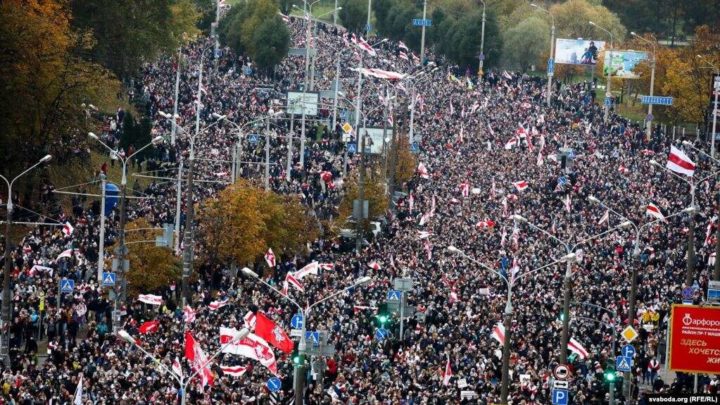The odds appear to be still in favour of President Alexander Lukashenko. Possibly, Moscow is also betting on that.
After a lull of the past 3-4 weekends, the anti-government protests in Minsk, Belarus, roared back to life today. This comes in the wake of three things.
One, there are some incipient signs that Moscow feels frustrated with the Belarus strongman President Alexander Lukashenko for retracting on the assurances he gave to President Vladimir Putin at their meeting in Sochi on September 14 to the effect that he would initiate constitutional reform and an inclusive political process, and thereafter hold fresh elections and accept a democratic verdict.
Two, a phone call by US Secretary of State Mike Pompeo to Lukashenka on October 23 has boosted the morale of the Belarus opposition. Three, the opposition candidate in the last election in August and the self-proclaimed “national leader” of Belarus Svetlana Tikhanovskaya has given call for nation-wide strikes w.e.f October 26, which has introduced an air of imminent apotheosis, real or surreal.
At a public event in Moscow on October 22, Putin dwelt generally on Russia’s predicament in the “post-Soviet space” seemingly with a sense of despondency and resignation. With an eye on Belarus, he lamented that the “community of interests” that bind the former Soviet republics is not sufficiently appreciated. As he put it, “a common infrastructure, common transport and energy system and a common language that unites rather than divides us, etc., is our distinct competitive advantage.”
Putin spotlighted how the colour revolution in Ukraine destroyed a country, which used to be “perhaps the most industrialised Soviet republic, not just one of them.” Putin said, “Read the statistics published by the Ukrainian statistical services: shrinking production, as if they had more than one pandemic. Some of the local industries, ones the entire Soviet Union and Ukraine itself were proud of – the aircraft industry, shipbuilding, rocket building – developed by generations of Soviet people, from all Soviet republics, a legacy Ukraine, too, could and should be proud of – are almost gone. Ukraine is being de-industrialised.”
In direct reference to the Belarus situation, Putin signalled that Russia has no intention to interfere in that country. He suggested that the West should also allow the Belarusian people “the opportunity to calmly handle their situation and make appropriate decisions.”
“The decisions they will make could pave the way for amending the country’s Constitution or adopting a new Constitution… nothing introduced from the outside without taking into account the peculiarities, culture and history of the people will ever work for that culture, those people,” he said.
On the face of it, this may be seen as a dramatic turnaround from the earlier Russian stance signalling that Moscow was determined to keep Belarus within the Russian orbit no matter what it takes.
The Russian media reported last week that the intelligence chief Sergey Naryshkin was in Minsk on an unannounced visit. According to the Nezavisimaya Gazeta newspaper, Lukashenka has become “too toxic” for the Kremlin, which is therefore pressing for constitutional reform and a probable successor in Minsk.
Pompeo’s call to Lukashenko the very next day suggests that Washington is testing the water. Washington is unsure sure whether: a) the Kremlin is waging a ‘psywar’ with Lukashenko to make him amenable to Russian demands; b) whether Russia could be veering round to accepting as fait accompli a regime change in Belarus and the emergence of a pro-western successor regime in Minsk; or, c) whether Moscow and Minsk are only staging an elaborate charade to hoodwink the US.
Of course, the likelihood is that all three above possibilities exist in a situation that is characterised by such abysmal lack of transparency all round. The chances of Pompeo taking up Putin’s offer to jointly promote an orderly democratic transition in Belarus must be altogether discounted in the current climate of US-Russia relations. Nor can Moscow expect a receptive European Union audience.
On the other hand, the fact that the weekend protests in Minsk have been energised would indicate that Washington is pushing ahead full-throttle with the colour revolution.
Indeed, if Tikhanovskaya’s strike call marshals significant support tomorrow from the workers in the Belarusian state-run industrial plants, it could be a turning point. The state controls 80 percent of Belarus’ command economy, and if the chain of command weakens, flood gates will be opened.
On the contrary, if the strike call flops, it will mean sudden death for the opposition protests which will be exposed as lacking mass support. The next week’s swing of the pendulum can be crucial for the endgame in Belarus. The odds appear to be still in favour of Lukashenko. Possibly, Moscow is also betting on that.






